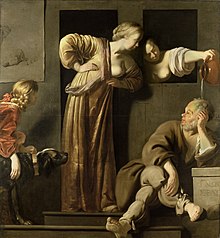Myrto
The original source for the claim that she was Socrates' wife appears to have been a work by Aristotle called On Being Well-Born,[1][2][3] although Plutarch expresses doubt that the work is genuine.
[2] A different account of Xanthippe and Myrto is given in Aristoxenus's Life of Socrates written in the latter part of the fourth century BC that Aristoxenus asserts is based on first-person accounts by his father.
[4] Although Diogenes Laërtius describes Myrto as Socrates' second wife living alongside Xanthippe, Myrto was presumably a common-law wife,[5] and Plutarch describes Myrto as merely living "together with the sage Socrates, who had another woman but took up this one as she remained a widow due to her poverty and lacked the necessities of life.
"[2] Athenaeus and Diogenes Laërtius report that Hieronymus of Rhodes attempted to confirm the story by pointing to a temporary decree the Athenians passed: For they say that the Athenians were short of men and, wishing to increase the population, passed a decree permitting a citizen to marry one Athenian woman and have children by another; and that Socrates accordingly did so.Neither Plato nor Xenophon mention Myrto, and not everyone in ancient times believed the story: according to Athenaeus, Panaetius "refuted those who talk about the wives of Socrates.
"[1] The story has generally not been believed by modern scholars, though some have accepted it – for instance J. W. Fitton, who argues that Myrto was Socrates' wife whereas Xanthippe was a citizen pallake ("concubine").
